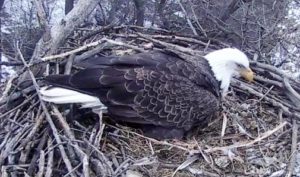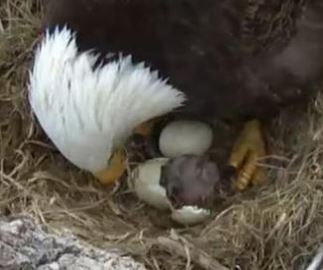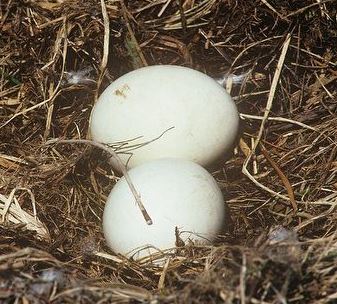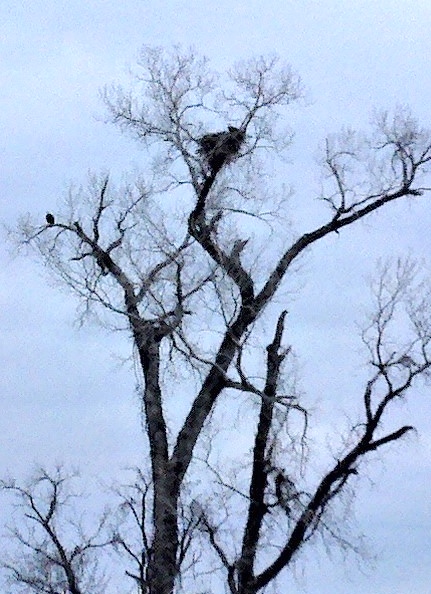By Donna Young and elfruler
Updated 10/27/18
© elfruler 2018
- Every female Bald Eagle has her own style of laying an egg that is usually consistent from egg to egg and year to year, although some variations in behavior may occur. Any departure from a previously observed style may indicate a new female.
- Rough predictions of when a first egg may be laid at a particular nest can be made on the basis of past years, since a pair tends to lay within a one- or two-week timeframe every year. A significant departure from timing may point to a change of female, male, or both. Click here for calendars of egg-laying at Bald Eagle nests observed on live cameras since 2006 (arranged by month).
- Timing of the first egg is the hardest to predict, but second and third (and in the rarest of cases, fourth) eggs will come at 3-day or 4-day intervals (never fewer than about 69 hours, and only rarely after more than 96 hours). See this page for statistics showing the time intervals at the eagle cams.
We have compiled a list of behaviors associated with egg-laying (oviposition) that we have observed over ten years of watching Bald Eagle cams online. We divide the signs into three periods: Prelude, The Main Event, and Postlude. A few signs are seen in all instances of oviposition, but we emphasize that no two events are alike, even with one specific bird.
PRELUDE
- Nest preparation
- For a few days before oviposition both male and female usually will spend more time in the nest, bringing in and arranging materials, especially the softer grasses, leaves, fronds, etc. that form the small cup where the egg(s) will be laid. They may dig with their beaks in the cup to help define and deepen it. Exceptions to this do occur – sometimes there is not much soft material to form a clear cup.
- Also for several days both parents probably will lie for a time in the nest cup, sometimes scraping backwards with their feet and pulling the soft materials in toward the boundary of the cup, all of which helps form it into a clear rounded indention.
- Behavior
- The female may begin to exhibit increasing lethargy for a day or few days before oviposition. She may stand in the nest or lie in the cup almost motionless for minutes or even hours. This is a great tease, and it may or may not lead immediately to egg-laying. Observable lethargy does not always occur.
- In some instances she may be absent from the nest just before oviposition, flying in (probably from a nearby perch) at the last minute.
- Just before oviposition she may seem restless, lying down and standing up, or circling the nest cup. She may rearrange the nest materials, dig in them with her beak or scrape with her feet.
- Her mate may bring her a gift of food in the hours or minutes preceding oviposition, which she will confiscate and usually mantle, and she may whine to communicate that he is to leave it for her. He will concede.

THE MAIN EVENT
- Body position
- The female must be slightly elevated above the nest cup to allow enough room for the egg to come out. She assumes a squatting or crouching position, either rising from a resting position or moving to the cup from another part of the nest. This squatting is usually clear, but sometimes, if the cup is very deep or if she is already incubating an egg or two, it is difficult to detect any lifting of her body.
- The body will be nearly parallel with the nest or at an angle of about 10-15 degrees with the tail low or flat on the nest. Wings may be pulled in tight or may bulge out slightly.
- She may look intently down into the nest cup in front of her.
- Behavior
- She may unfold and refold one wing and then the other over her back once or several times, and settle her feet into the cup.
- She may release a small amount of wastes into the nest, clearing her cloaca for the egg. The tail usually flips up slightly for this.
- She may remain very still, seemingly unfocused, or she may look around even during contractions.
- Her body feathers may fluff outward.
- Contractions may be marked by any of the following:
- Her upper back and shoulders may constrict clearly with each contraction.
- Feathers on her nape, back, sides, and wings may shudder, lift, and/or fluff out with contractions.
- Her wings may flex outward slightly with each contraction.
- She usually toggles from foot to foot after each contraction.
- Her tail may rise slightly with each contraction.
- Her body may tip backward and forward slightly.
- She may exhale soft whistles and/or chirps with each contraction.
- She may lower down further into cup, head hunkered into her shoulders.
- She may spread her wings at the elbow and appear to prop herself on them during contractions.
- Visible contractions may last as briefly as 1-2 minutes or as long as 7-8 minutes.
- Final push is always marked by an end of the contractions. It may also be marked by:
- Shaking and shuddering of the entire body.
- A final loud chirp or whistle.
- A quick, sharp flip of the tail.
- A dramatic jump and spreading up and/or outward or flapping of the wings.
- Hardly any detectable movement at all, in which case the cessation of contractions is the only clear indication that the egg has emerged.
- After the final push any of the following may occur:
POSTLUDE
- She begins incubating after laying, but this may occur in one of several ways:
- She may immediately step up and out of the nest cup and examine the new egg, nudge or roll it, lower herself and shimmy her brood patch onto the egg(s), and settle into incubating.
- She may remain in a squat above the egg(s) for as long as 20-30 minutes, staying still or perhaps looking around before she steps aside to check the new egg.
- She may stand aside or above the egg leaving it exposed for many minutes before incubating.
- She may not step aside at all but immediately or after a few minutes simply lower herself over the cup and begin incubating, in which case the egg may not be seen for many minutes or even hours.
elfruler’s YouTube channel has dozens of videos of oviposition at eagle cams from 2011 to the present.
© elfruler and Donna Young 2018









You must be logged in to post a comment.